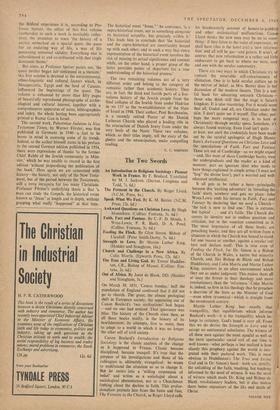The Two Swords
An Introduction to Religious Sociology : Pioneer Work in France. By F. Boulard. Translated by M. J. Jackson. (Darton, Longman and Todd, 7s. 6d.) The Ferment in the Church. By Roger Lloyd. (S.C.M. Press, 6s.) Awkward Questions on Christian Love. By Hugh Montefiore. (Collins: Fontana, 3s. 6d.) Faith, Fact and Fantasy. By C. F. D. Moule, J. Wren-Lewis, P. R. Baelz, D. A. Pond. (Collins: Fontana, 3s. 6d.) Feeding the Flock. By Glyn Simon, Bishop of
(Hodder and Stoughton, 16s.)
Church and Challenge in a New Africa. By Colin Morris. (Epworth Press, 12s. 6d.) ON March 30, 1851, 'Census Sunday,' half the population of England confessed that it did not go to church. The' great, the almost geological shift in European society, the separating out of Canon Boulard's 'two civilisations' had begun —and no one had noticed. That ignorance was bliss. The history of the Church since then, as all these books testify, is the history of its bewilderment, its attempts, first to resist, then to adapt to a world in which it was no longer the other self of civil society.
Canon Boulard's Introduction to Religious Sociology is the classic analysis of the change as it happened in France. Classic because disciplined, because tranquil. It's true that the purpose of his investigations and those of his colleagues is, ultimately, evangelical: he wants to understand the situation so as to change it. But he enters into a 'willing suspension of belief' and writes as a sociologist about a sociological phenomenon, not as a Churchman fretting about the decline in faith. This profes- sionalism protects him from the fume and fuss, The Ferment in the Church, as Roger Lloyd calls
his headmasterly account of honest-to-goddery and other ecclesiastical malfunctions. Canon Lloyd thinks the new men may be on to some- thing: if they listen to the voice of experience, we shall have (this is the latest cry) a 'new reforma- tion' and all will be gas—and gaiters. It won't, of course; that new reformation is a rather sad little endeavour to get back to where we were, cosy and one with the secular community.
There are two ways in which Christians try to contain the miserable self-consciousness of alienation. One is to hold secular culture up to the mirror of belief, as Mrs. Baxter does in her discussion of the modern theatre. This is a use- ful book for educating uncouth Christians-- those who think still that the stage is Satan's kingdom. It is also reasstxring. For it would seem that all, Godot and all, are Christian under the skin. I don't quite see it myself. The other, per- haps the more congenial way, is to look at Christianity through secular specs. Somehow, it's always found wanting. Even God isn't quite .
at least, not until the credentials have been made out by the careful apologetic of Hugh Monte- fiore's Awkward Questions on Christian Love and the speculations of Faith. Fact and Fantasy. These are out of Cambridge—as we might expect --and, like most of those Cambridge books, treat the undergraduate and the reader as a kind of monster, part an ignorant idiot who needs to have things explained in simple terms CI must not "hog" the divine love'), part a worried and well- educated intellectual.
It all gets to be rather a bore—principally
because this 'exciting adventure' in `retooling the faith' starts nowhere and gets no place. John Wren-Lewis ends his lecture in Faith, Fact and Fantasy by declaring that we need a Church— `the task is now to find one.' This is extreme, but typical . . . and it's futile. The Church dis- covers its identity not in endless question and criticism, but in the vocation committed to it. The most impressive of all these books are preaching books, and they are all written from a situation in which the Church was bound to stand, for one reason or another, against a secular cul- ture and declare itself. This is true even of Feeding the Flock, for Dr. Simon is a Bishop of the Church in Wales, a native but minority Church, and, like Bishop de Blank and Bishop Huddleston, and Colin Morris and Martin Luther King, ministers in an alien environment which they see as under judgment. This makes them all at once the firmer in their theology and more revolutionary than the `reformers.' Colin Morris is, indeed, so firm in his theology that he preaches a doctrine of the State as the Minister of God —even when tyrannical--which is straight from the seventeenth century.
Martin Luther King' has exactly that tranquillity, that equilibrium which informs Boulard's work—it is the tranquillity which be- longs to certainty. God's hand is over all. From this we do derive the Strength to Lore and to accept no sentimental substitutes. The witness of all these men against the most squalid as well as the most spectacular social evil of our time is well known—what perhaps is less realised is how closely this prophecy against the world is inte- grated with their pastoral work. This is most obvious in Huddleston's The True and Livitu; God and in Dr. Simon's book—both are, strictly. the unfolding of the faith, teaching, but teaching informed by the need of witness. It was the need of witness which made Dr. King and Bishop de Blank revolutionary leaders, but it also makes them better expositors of the .life and death of Christ.
VALERIE purr


































 Previous page
Previous page